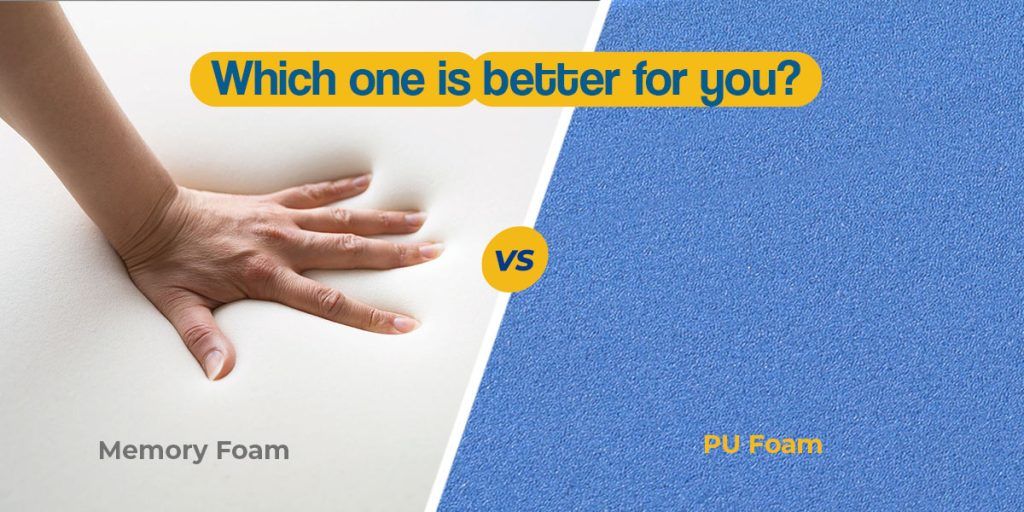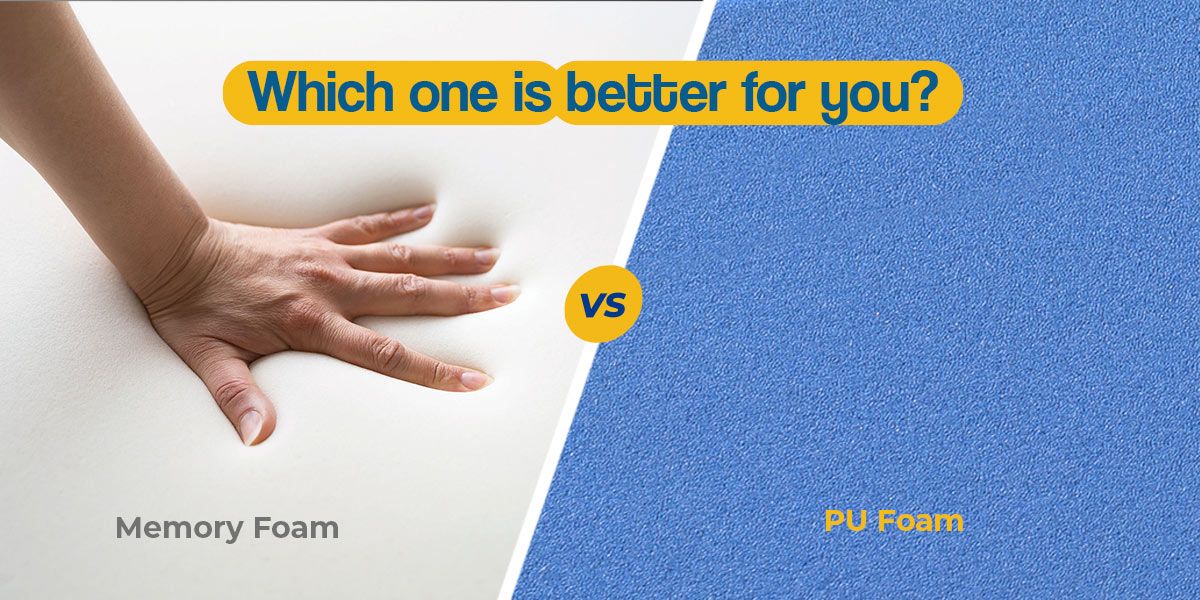
Introduction
Selecting the ideal mattress could be quite a daunting task, given the numerous choices out there. There are two common varieties of foam: memory foam and PU foam. Both provide comfort; however, they are not identical in feel, supportive attributes, or sturdiness. Knowing the type’s features will allow you to conclude whose features among memory foam vs pu foam meet your sleeping needs and preferences.
Understanding the Basics
memory foam vs pu foam foam are two basic categories of foam mattresses that are famous on the market today. Memory foam adorns itself with the shape of the body because it has been designed for pressure relief and durability. PU foam, or polyfoam, is more buoyant and supportive, which gives the mattress more firmness.
What is memory foam?
Memory foam is a polyurethane foam-based product that conforms and adapts to the shape of the body and the heat and weight applied to it. It conforms to the stature or shape that you have, thereby giving you much-needed support and relieving pressure. They were mainly designed for couples, as the material has special functions in terms of absorbing motion.
What is PU foam?
PU foam, or polyurethane foam, as it is known, is a material that finds several uses, including in mattresses. It costs slightly less than memory foam and has better support, consequently. PU foam commonly used for mattresses provides good support but is slightly less conforming and pressure-relieving than memory foam.
Comparing Memory Foam vs Polyurethane Foam
Memory foam vs pu foam provides different kinds of feel to people sleeping on the mattress. Memory foam conforms to the user and helps with pressure relief, thus offering the impression of sinking. PU foam is easier on the body; thus, it is more substantial and has a better and more responsive feel. It is generally less warm but might not offer as snug a fit against the body as memory foam.
Comfort and support
When it comes to comparison between polyurethane foam vs memory foam, memory foam is excellent in terms of comfort; it adapts to the contours of the body and relieves pressure. It is specially designed for side-sleepers and arthritis patients. PU foam provides an adequate amount of support and springs back, which makes it ideal for back and stomach sleepers.
Durability and longevity
As compared to the other materials, both memory foam vs Polyurethane mattresses provide moderate durability, though the usage of a mattress, its quality, and its care determine its usability duration. Memory foam mattresses are denser and more resilient than other traditional types; that’s why they are longer-wearing. There is a possibility for PU foam mattresses to exhibit an earlier sign of wear and tear compared to rubberised-planed NPF, particularly in locations that receive pressure.
Temperature Regulation
When it comes to comparison between polyurethane foam vs memory foam, memory foam mattresses are notorious for capturing heat, which, while warm in the winter, can be quite unpleasant at other times. PU foam mattresses usually have improved breathability, making them cool to use during hot weather.
Allergies and Sensitivities
PU foam vs Memory Foam both mattresses, can be hypoallergenic if specifically developed from good-quality, safe materials. But there can be cases of people who develop allergies to some of the chemicals that are used in the production of Metro. PU foam could also be more resistant to the holding of dust mites and allergens as compared to memory foam.
Pros and Cons of Memory Foam vs PU Foam
Memory Foam
- Pros: It relieves pressure very well, it conforms to the shape of the body, and it is good at limiting the transfer of movement.
- Cons: It may retain heat, react rather slowly, and emit certain gases.
PU Foam
- Pros: inexpensive, accommodating, and excellent for those who sleep on their backs.
- Cons: There is not as much contouring as the memory foam and it could be a little on the lower side of pressure relief; the durability is not exactly consistent.
Best Uses for Each Foam Type
- Memory Foam: Great for side sleepers, those who suffer from joint pain, and those who would like to have the most pressure relief and cushioning of the body.
- PU Foam: Most appropriate for back and stomach-sleeping individuals, mainly because of the firmness of the mattress. It is affordable and recommended for people with limited budgets who don’t require the aspect of deep sinking.
How to Choose Between Memory Foam and PU Foam
The choice between Polyurethane vs memory foam is hinged on the choice of mattress to be used while sleeping. If you want pressure relief, body contouring, and a reduction in motion transfer, memory foam might be for you. However, when choosing its type, it is worth thinking about its capacity to store heat.
Conclusion
As with any type of memory foam as well as PU foam launched in the market by Centuary Mattress, they provide special characteristics. Memory foam is good at pressure distribution, while PU foam has support and rebounding properties. Therefore, it is essential to break it down to comprehend which is the best one depending on your personal values, sleeping habits, and purse.
FAQs
Memory foam aligns with the body as it takes on the pressure and sinking feeling of it. PU foam is more supportive and bouncy, hence offering a firmer surface than that of latex foam. Be it memory foam vs pu foam, Centuary Mattress offers a range of high-quality mattresses to suit your every need.
The Centuary Mattress memory foam is great in this regard because it provides comfort, given that it conforms to the shape of your body to alleviate pressure. PU foam is quite supportive and bouncy, but it lacks the hugging feel that customers find with memory foam.
When it comes to the comparison between pu foam vs memory foam: PU foam performs better than memory foam. The Centuary Mattress PU foam boasts an open-cell structure that promotes adequate airflow to eliminate heat buildup. Moreover, it prevents that uncomfortable “sleeping hot” sensation, making it an excellent choice for those who tend to sleep warm.
In general, memory foam mattresses can be identified as more durable as compared to PU foam, and this addition is associated with increased density. Still, quality and proper care also determine the duration the products will last. Visit your nearest Centuary Mattress store to explore the online collection of foam mattresses.
Everything that comes with advantages has disadvantages as well. Memory foam, or PU foam, comes with its own health concerns, such as off-gassing and possible allergens. It is always advisable to allow your mattress to get some fresh air before use. Visit your nearest Centuary Mattress store to learn more about different kinds of mattresses.

